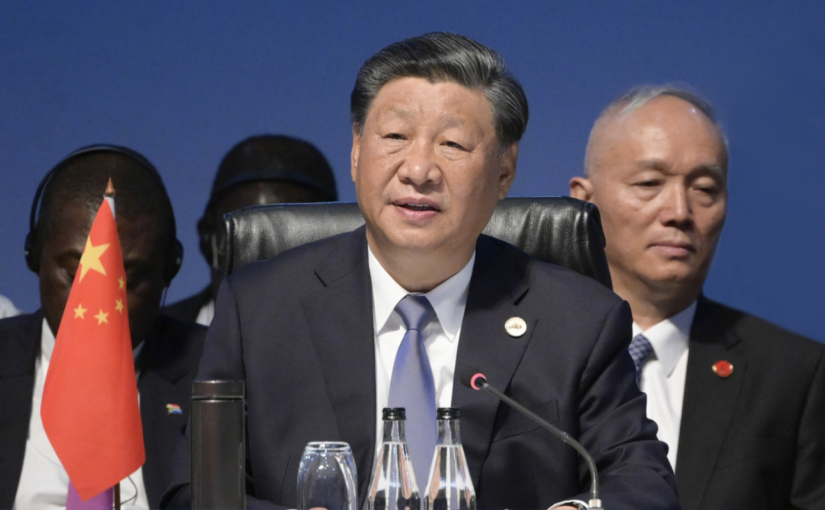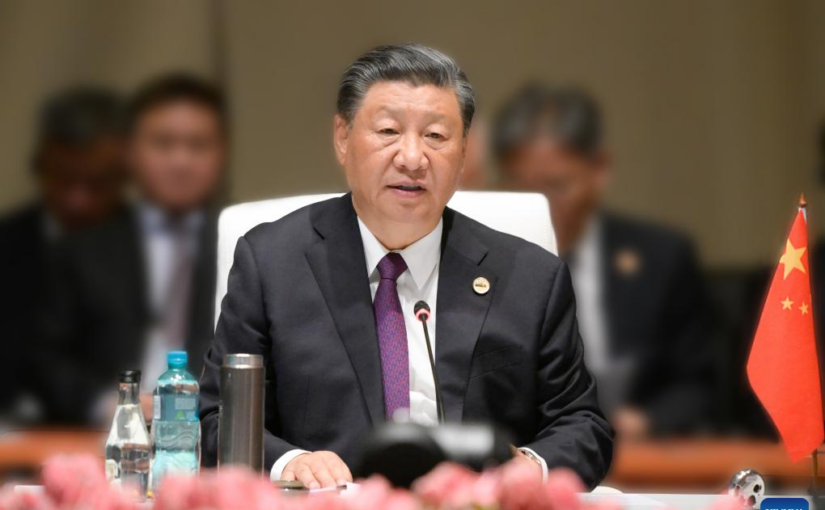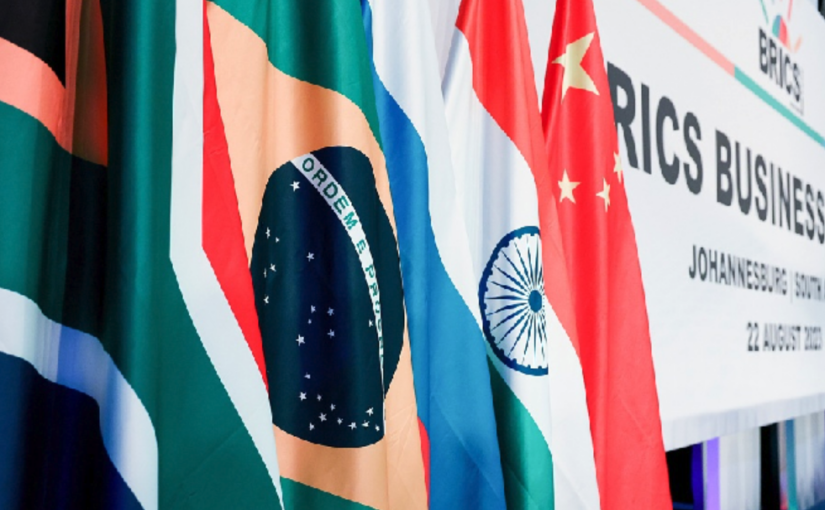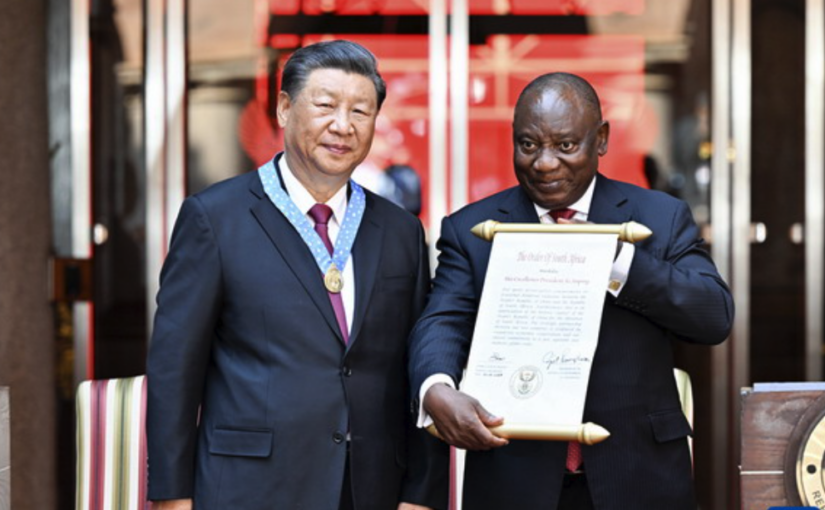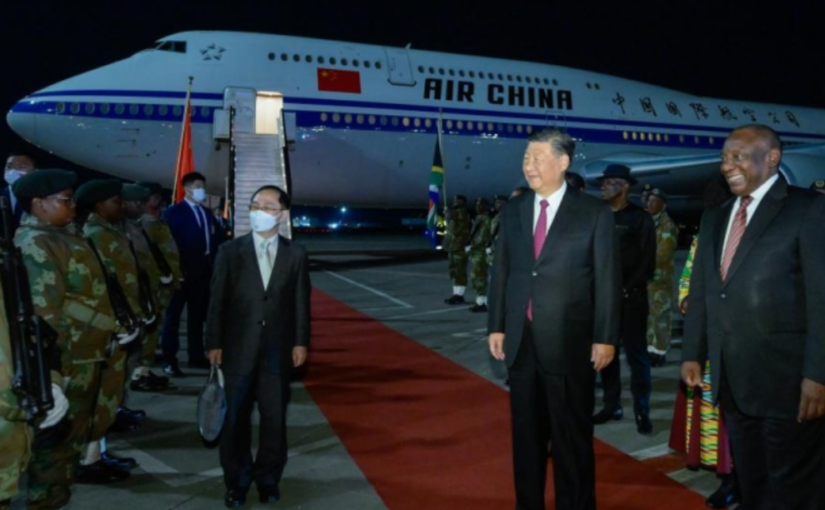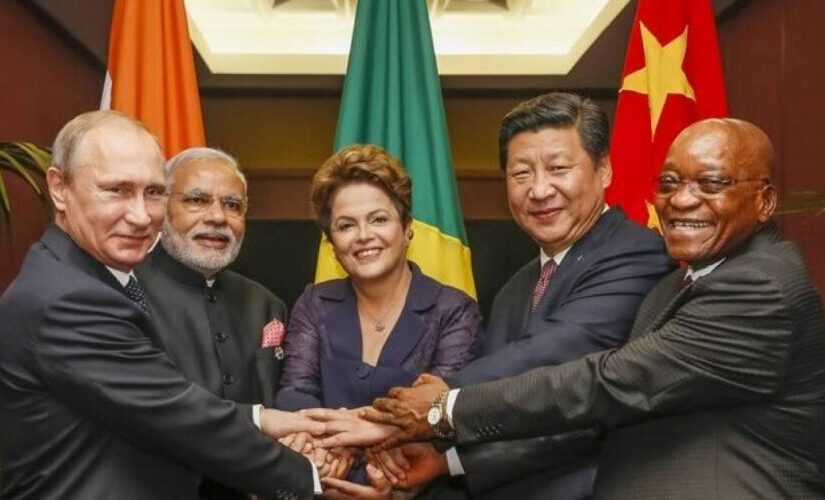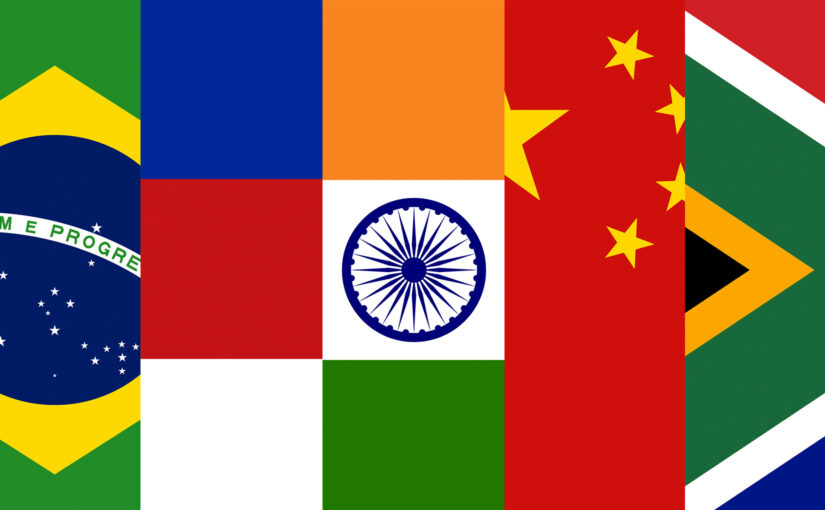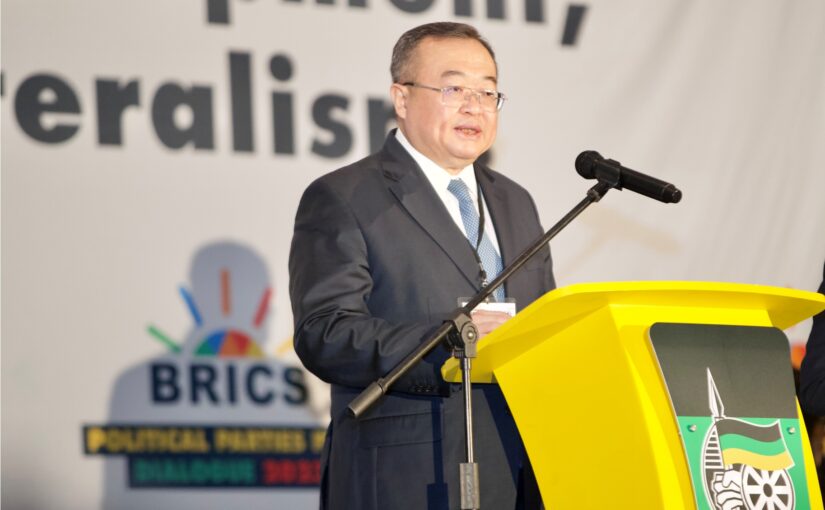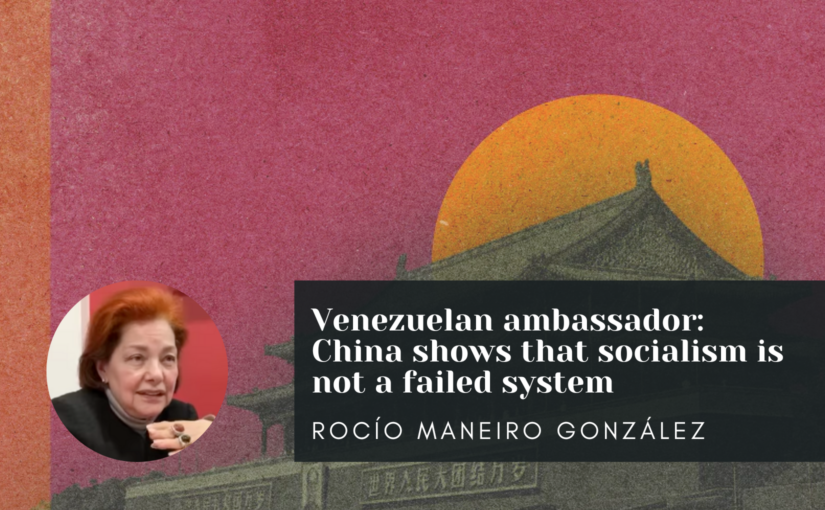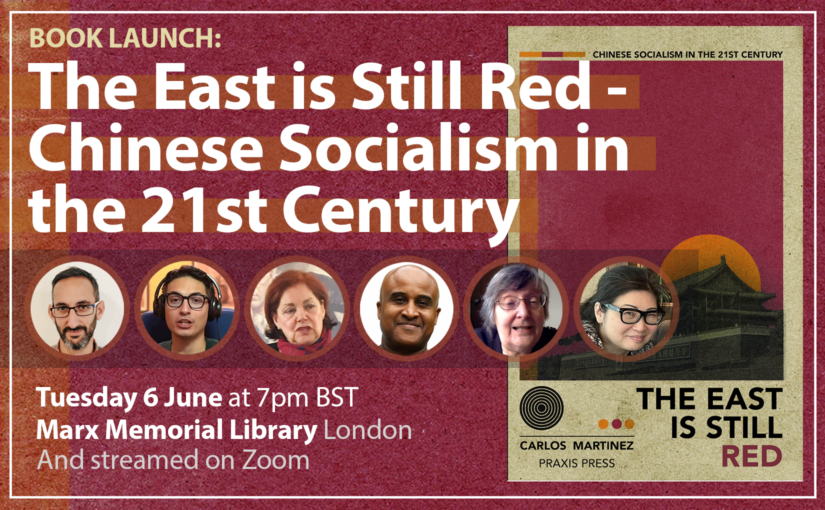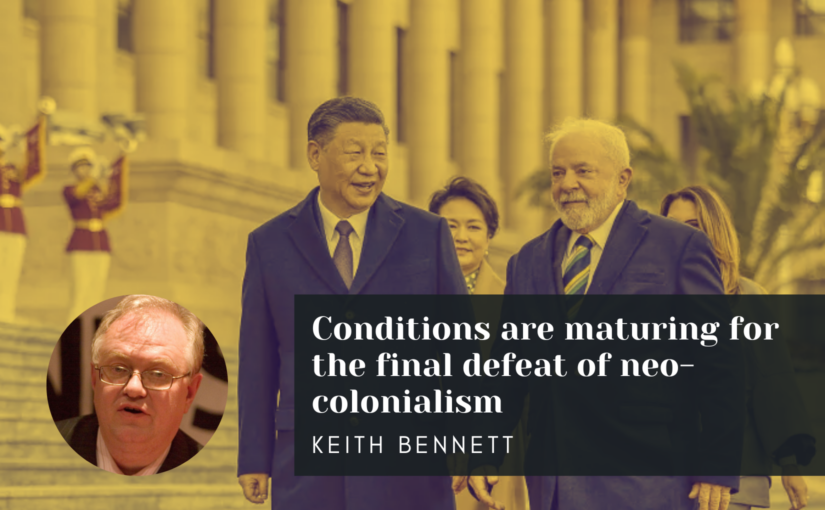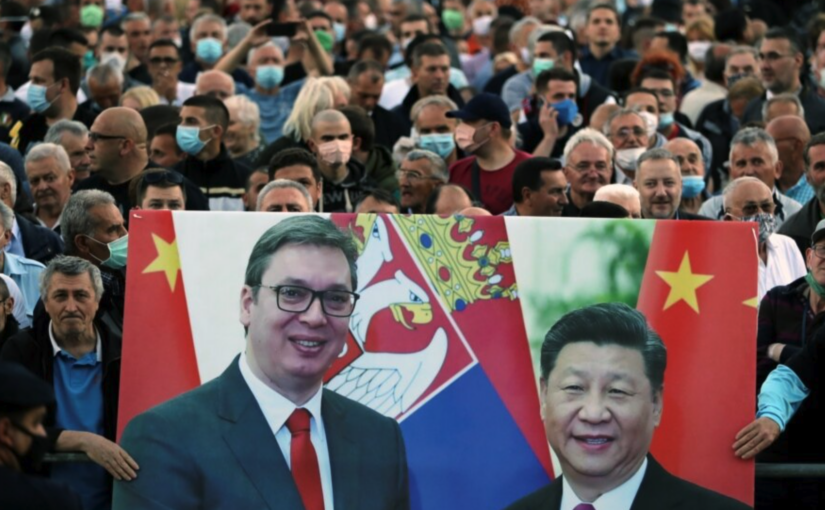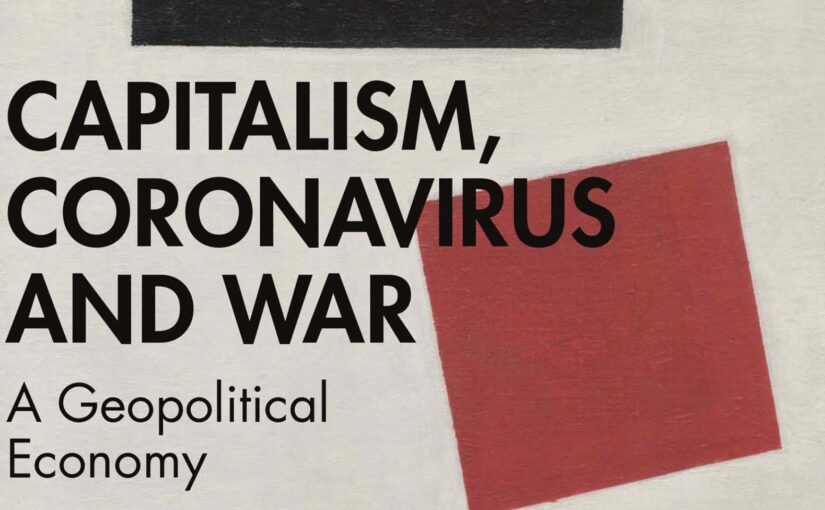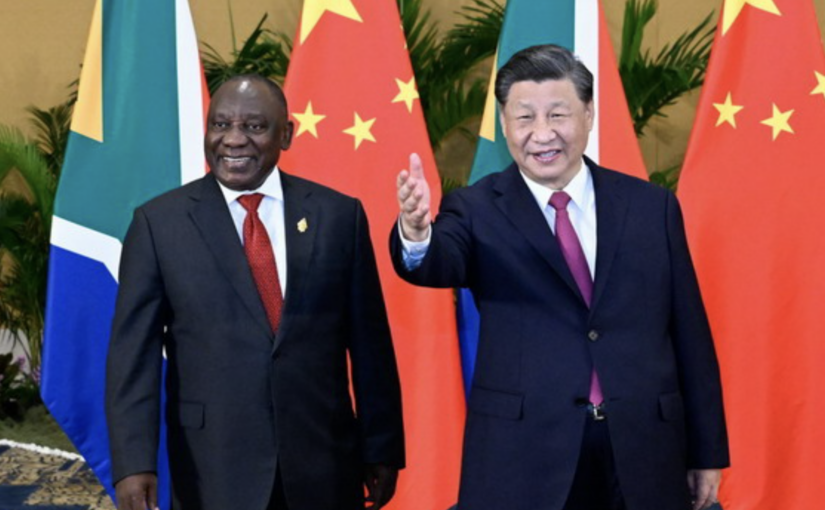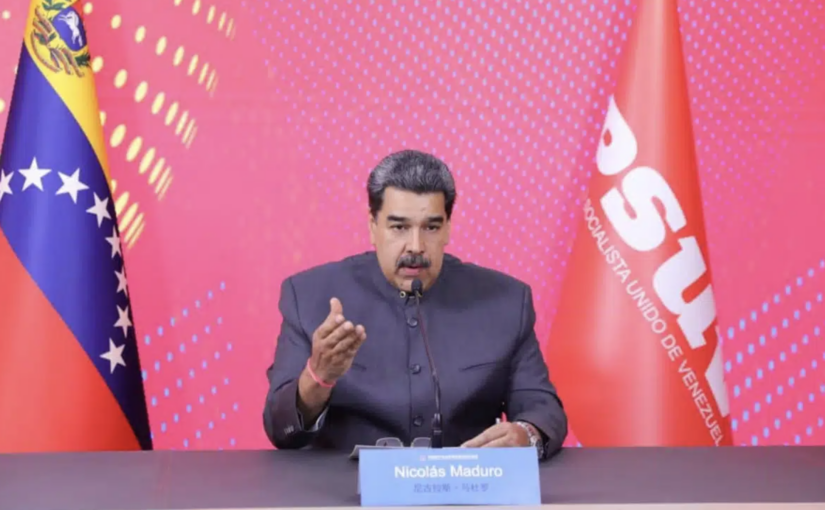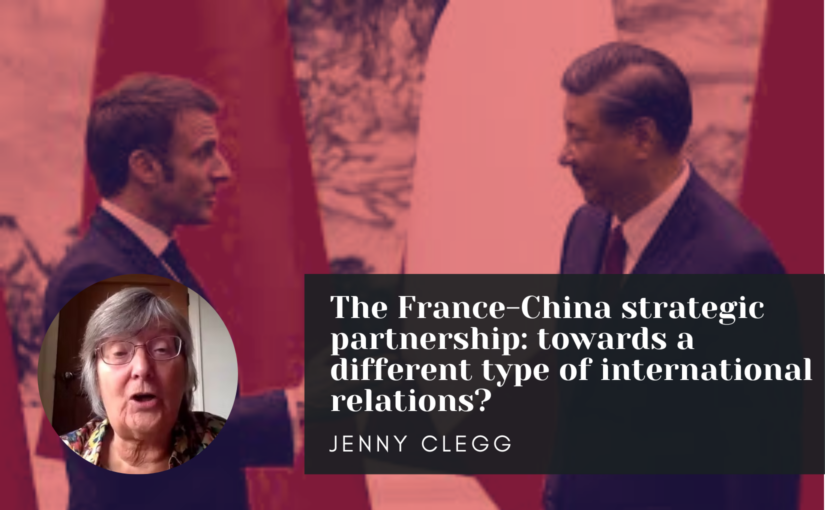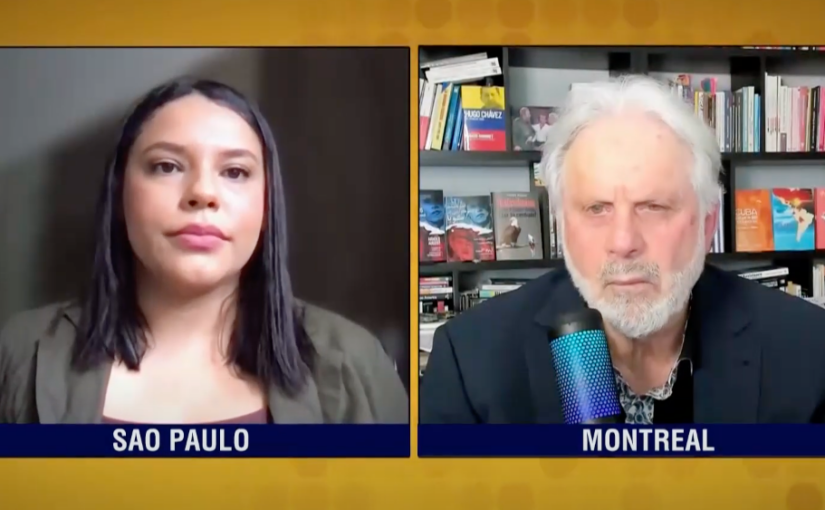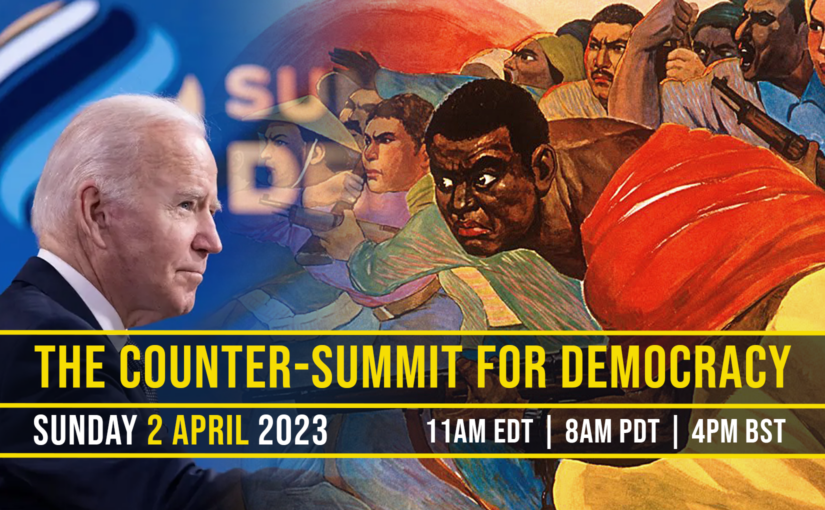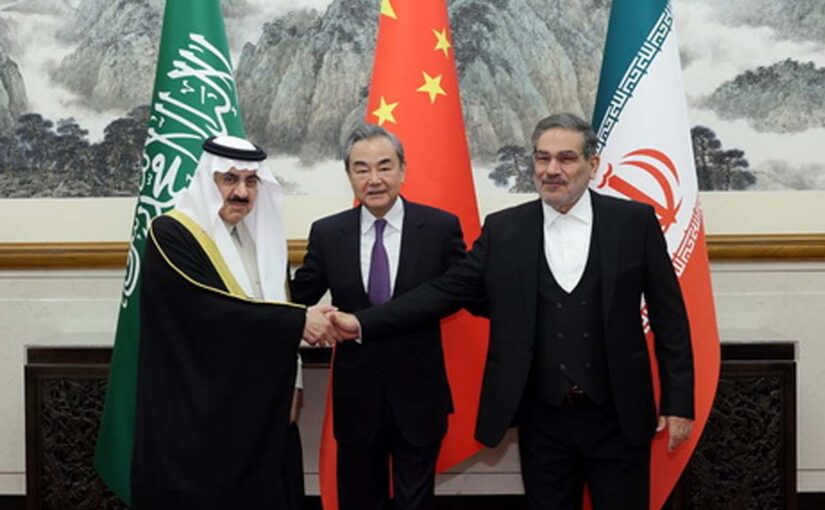In this edition of the CGTN series, Leaders Talk, conducted in May but only recently screened, essentially coinciding with the BRICS summit in South Africa, Zou Yun interviews Dilma Rousseff, former President of Brazil and now President of the BRICS-initiated New Development Bank (NDB). The interview was recorded at the bank’s Shanghai headquarters. As President of Brazil in 2014, Dilma was one of the signatories to the founding document of the bank.
Dilma explains how developing countries and emerging markets of the Global South need investment, for example in physical and digital infrastructure so as to improve their people’s lives. But they suffer from problems such as a lack of access to credit and the non-convertibility of their currencies. The latter, in particular, contributes to reinforcing dollar hegemony, which adversely affects them, whether in terms of susceptibility to changes in US interest rates or the US propensity to arbitrarily impose sanctions and exercise ‘long-arm jurisdiction’, seeking to impose US domestic legislation on others. Therefore, conducting at least a portion of external trade in local currencies is vital. It is related to the development of a multipolar world.
According to Dilma, the US’ imposition of punitive tariffs on China is a grave mistake. Not only does it cause economic problems for China – it fragments global supply chains and impacts economic growth in a way unfavourable to all countries. She notes that 40 years ago, China was an impoverished country, but today it is the world’s second greatest economy. US tactics such as ‘friend shoring’, she notes, can be no substitute for China’s huge market.
Regarding US sanctions policy, Dilma insists that they are effectively just another form of war. Their aim is to prevent development and negatively impact the lives of the people, with the aim of triggering a change of system.
In contrast, she expresses her strong support for the series of international initiatives put forward by President Xi Jinping, which she considers have peace and development at their core. She further describes Xi as a great leader, who has appeared at the right time and place. During her term of office, and under President Lula, Brazil succeeded in lifting 36 million people out of absolute poverty. She knows the challenges that had to be met to achieve that, so lifting 800 million people out of poverty, as China has done, is a historic event in the story of human development.
The full interview with Dilma Rousseff is embedded below.
Category: Multipolarity
Remarks by Xi Jinping at the BRICS-Africa Outreach and BRICS Plus Dialogue
Alongside the main BRICS Summit, held in the South African city of Johannesburg, a ‘BRICS-Africa Outreach and BRICS Plus Dialogue’ was held on the sidelines on August 24
Hosted by South African President Cyril Ramaphosa, the event was attended by Chinese President Xi Jinping, Brazilian President Luiz Inácio Lula da Silva and Indian Prime Minister Narendra Modi. Russian President Vladimir Putin participated online.
More than 60 leaders and representatives of African countries and other emerging markets and developing countries, as well as United Nations Secretary-General Antonio Guterres, President of the New Development Bank Dilma Rousseff, and leaders of other international and regional organizations, also attended.
Xi Jinping delivered remarks at the dialogue under the title, ‘Hand in Hand Toward a Community of Shared Development’. He began by noting that:
“Development embodies our people’s aspiration for a better life. It is the top priority for developing countries and a timeless theme for humanity. As the UN 2030 Agenda for Sustainable Development is due for a midterm review this year, the delivery of most Sustainable Development Goals remains slow. This is a cause for concern, and the global development endeavour faces formidable challenges.”
Xi pointed out that China has invariably stood in solidarity with fellow developing countries through thick and thin. The country has been and will always remain a member of the developing countries. Since holding the first High-Level Dialogue on Global Development last year, China has set up a Global Development and South-South Cooperation Fund, with a total funding of four billion US dollars, and Chinese financial institutions will soon set up a special fund of 10 billion dollars dedicated to the implementation of the Global Development Initiative (GDI).
Xi added:
“Over the past decade, China has provided a large amount of development assistance to Africa and helped build more than 6,000 km of railway, over 6,000 km of highway, and 80-plus large power facilities on the continent. Going forward, China will carry out more cooperation with African countries to support Africa in enhancing its own capacity for development. Specific measures will be taken, such as providing satellite mapping data products, implementing a Smart Customs cooperation partnership, and launching with UNESCO a ‘GDI for Africa’s Future’ action plan, to support sustainable development in Africa.”
The following is the full text of President Xi’s remarks. It was originally published by the Xinhua News Agency.
Hand in Hand Toward a Community of Shared Development
Remarks by H.E. Xi Jinping, President of the People’s Republic of China
At the BRICS-Africa Outreach and BRICS Plus Dialogue
Johannesburg, August 24, 2023
Your Excellency President Matamela Cyril Ramaphosa,
Colleagues,
Let me begin by thanking President Ramaphosa for preparing the Dialogues. I am delighted to join you all in this discussion on global development.
Development embodies our people’s aspiration for a better life. It is the top priority for developing countries and a timeless theme for humanity. As the UN 2030 Agenda for Sustainable Development is due for a midterm review this year, the delivery of most Sustainable Development Goals remains slow. This is a cause for concern, and the global development endeavor faces formidable challenges.
The international community must pursue the larger interests of all countries, respond to people’s concerns, and restore development to the center of the international agenda. The representation and voice of developing countries in global governance should be increased, and developing countries be supported in realizing better development. It is also important to uphold true multilateralism, forge a global development partnership, and create a secure and stable international environment for shared development.
Continue reading Remarks by Xi Jinping at the BRICS-Africa Outreach and BRICS Plus DialogueXi Jinping at 15th BRICS Summit: Cold War mentality is still haunting our world
Chinese President Xi Jinping delivered a speech to the 15th BRICS Summit, held in Johannesburg, South Africa, on August 23.
Aptly titled, ‘Seeking Development Through Solidarity and Cooperation and Shouldering Our Responsibility for Peace’, and noting that BRICS is an important force in shaping the international landscape, the Chinese leader said early in his speech that:
“We [the BRICS countries] choose our development paths independently, jointly defend our right to development, and march in tandem toward modernisation. This represents the direction of the advancement of human society, and will profoundly impact the development process of the world.”
Making a series of practical proposals, the Chinese leader called for deepening business and financial cooperation to boost economic growth. Development, he noted, is an inalienable right of all countries, not a privilege reserved for a few. “We BRICS countries should be fellow companions on the journey of development and revitalisation, and oppose decoupling and supply chains disruption as well as economic coercion. We should focus on practical cooperation, particularly in such fields as digital economy, green development, and supply chain, and bolster economic, trade and financial exchanges.”
He also called for expanding political and security cooperation to uphold peace and tranquility.
“The Cold War mentality is still haunting our world, and the geopolitical situation is getting tense. All nations long for a sound security environment. International security is indivisible. Attempts to seek absolute security at the expense of others will eventually backfire.”
Regarding the Ukraine crisis, he said that it had “evolved to where it is today because of complex reasons. What is pressing now is to encourage peace talks, promote de-escalation, end the fighting, and realise peace. No one should add fuel to the fire to worsen the situation.”
Turning to the talk of the so-called ‘rules based international order’ touted by a handful of countries, Xi said that:
“International rules must be written and upheld jointly by all countries based on the purposes and principles of the UN Charter, rather than dictated by those with the strongest muscles or the loudest voice. Ganging up to form exclusive groups and packaging their own rules as international norms are even more unacceptable.”
The following is the full text of President Xi’s speech. It was originally published by the Xinhua News Agency.
Your Excellency President Matamela Cyril Ramaphosa,
Your Excellency President Luiz Inacio Lula da Silva,
Your Excellency President Vladimir Putin,
Your Excellency Prime Minister Narendra Modi,
I am very pleased to join you in Johannesburg for the important discussions on BRICS cooperation and development. It is especially significant that the BRICS Summit is held in Africa for the third time. I wish to thank President Ramaphosa and the South African government for the thoughtful arrangements.
We gather at a time when the world has entered a new period of turbulence and transformation. It is undergoing major shifts, division and regrouping, leading to more uncertain, unstable and unpredictable developments.
BRICS is an important force in shaping the international landscape. We choose our development paths independently, jointly defend our right to development, and march in tandem toward modernization. This represents the direction of the advancement of human society, and will profoundly impact the development process of the world. Our track record shows that we have consistently acted on the BRICS spirit of openness, inclusiveness and win-win cooperation, and taken BRICS cooperation to new heights in support of our five countries’ development. We have upheld fairness and justice in international affairs, stood up for what is right on major international and regional issues, and enhanced the voice and influence of emerging markets and developing countries. BRICS countries invariably advocate and practice independent foreign policies. We always address major international issues based on their merits, making fair remarks and taking fair actions. We do not barter away principles, succumb to external pressure, or act as vassals of others. We BRICS countries share extensive consensus and common goals. No matter how the international situation changes, our commitment to cooperation since the very beginning and our common aspiration will not change.
Continue reading Xi Jinping at 15th BRICS Summit: Cold War mentality is still haunting our worldXi Jinping: Enhancing solidarity and cooperation to overcome risks and challenges and jointly build a better world
Prior to the opening of the main BRICS Summit in Johannesburg, South Africa, a BRICS Business Forum was held on August 22, marking ten years since the birth of the BRICS Business Council, also in South Africa.
In an address to the forum’s closing ceremony, which was read on his behalf by Chinese Commerce Minister Wang Wentao, President Xi Jinping, noting that, “changes in the world, in our times and in history are unfolding in ways like never before, bringing human society to a critical juncture”, posed the following questions:
“Should we pursue cooperation and integration, or just succumb to division and confrontation? Should we work together to maintain peace and stability, or just sleepwalk into the abyss of a new Cold War? Should we embrace prosperity, openness and inclusiveness, or allow hegemonic and bullying acts to throw us into depression? Should we deepen mutual trust through exchanges and mutual learning, or allow hubris and prejudice to blind conscience? The course of history will be shaped by the choices we make.”
The Chinese leader noted that humanity has “achieved notable economic development and social progress over the past decades, and that is because we have drawn lessons from the two world wars and the Cold War… and embarked on the right path of openness and development for win-win cooperation… What people in various countries long for is definitely not a new Cold War or a small exclusive bloc; what they want is an open, inclusive, clean and beautiful world that enjoys enduring peace, universal security and common prosperity.”
Stressing the need to promote development and prosperity for all, President Xi continued: “Many emerging markets and developing countries (EMDCs) have come to what they are today after shaking off the yoke of colonialism. With perseverance, hard work and huge sacrifices, we succeeded in gaining independence and have been exploring development paths suited to our national conditions. Everything we do is to deliver better lives to our people. But some country, obsessed with maintaining its hegemony, has gone out of its way to cripple the EMDCs. Whoever is developing fast becomes its target of containment; whoever is catching up becomes its target of obstruction. But this is futile, as I have said more than once that blowing out others’ lamp will not bring light to oneself.
“Every country has the right to development, and the people in every country have the freedom to pursue a happy life. With that in mind, I have proposed the Global Development Initiative, with the goal of promoting development for all by the international community and boosting the UN 2030 Agenda for Sustainable Development.”
Highlighting the increasing role of the BRICS countries in the global economy, the Chinese leader noted: “The collective rise of EMDCs represented by BRICS is fundamentally changing the global landscape. EMDCs have contributed as high as 80 percent of global growth in the past 20 years, and their share in the global GDP has increased from 24 percent 40 years ago to more than 40 percent.”
Xi again expressed China’s support for more countries to join the BRICS mechanism, while noting that this is not a matter of pressing countries to take sides or fomenting confrontation:
“The gathering between BRICS countries and more than 50 other countries in South Africa today is not an exercise of asking countries to take sides, nor an exercise of creating bloc confrontation. Rather, it is an endeavor to expand the architecture of peace and development. I am glad to note that over 20 countries are knocking on the door of BRICS. China hopes to see more joining the BRICS cooperation mechanism.”
We reprint below the full text of President Xi’s speech. It was originally carried on the website of the Chinese Foreign Ministry.
Your Excellency President Matamela Cyril Ramaphosa,
Members of the Business Community,
Ladies and Gentlemen,
Friends,
I wish to extend my warm congratulations on the success of the BRICS Business Forum in South Africa!
Ten years ago here in South Africa, we BRICS leaders witnessed the birth of the BRICS Business Council. Since then, the Council has stayed true to its founding mission. It has seized opportunities to deepen cooperation, contributing to economic and social development of BRICS countries and helping sustain global economic growth.
Continue reading Xi Jinping: Enhancing solidarity and cooperation to overcome risks and challenges and jointly build a better worldSouth Africa and China have an unbreakable bond
Chinese President Xi Jinping paid his fourth state visit to the Republic of South Africa immediately before the country hosted the BRICS Summit.
Meeting his South African counterpart Cyril Ramaphosa in the capital Pretoria on August 22, the two leaders agreed to work together to take the China-South Africa comprehensive strategic partnership to new heights and to build a high-quality China-South Africa community with a shared future.
To this end, President Xi made four proposals:
- China and South Africa should be strategic partners with a high degree of mutual trust. Comradeship and brotherhood are inherent to the bilateral relationship.
- China and South Africa should be development partners making progress together. Mutual benefits and win-win are defining features of their cooperation.
- China and South Africa should be friendly partners enjoying mutual understanding. Close ties between the two peoples are a vivid example of amity between the two countries.
- China and South Africa should be global partners with a commitment to justice. Independence is a principle upheld by both countries.
President Ramaphosa noted that it is a great pleasure to receive President Xi Jinping for his fourth state visit to South Africa. China lent precious support to South Africa during its struggles for national independence and liberation and in its pursuit of national development. China gave South Africa much-needed support in difficult times such as during the COVID-19 pandemic. China is a true friend, brother, and partner of South Africa.
The South African leader went on to say that the world today is faced with geopolitical challenges, energy crises and many other serious and complex issues. He fully agrees with President Xi Jinping’s proposal for win-win cooperation. South Africa and other countries in the Global South all hope to strengthen solidarity and cooperation with China to better meet challenges together, and promote an international order that is more egalitarian, just, and equitable.
Following their talks, President Ramaphosa awarded Xi the Order of South Africa, his country’s highest honour for heads of state of friendly countries. The two leaders also witnessed the signing of various bilateral cooperation agreements, and the two sides also agreed a 15-point Joint Statement.
In a related report, the Xinhua News Agency, noted that: “Amidst Western media’s distorted reports accusing China of ‘colonising’ African nations, including South Africa, it is notable that South Africans describe their relationship with China as one of ‘comradeship’ and ‘brotherly friendship’.”
This sense of unity stems from China’s support to the South African people in fighting apartheid, and standing with the African National Congress (ANC) as comrades and friends, according to ANC Secretary-General Fikile Mbalula. Apart from strong economic links, “it is a relationship that is formed by ties of anti-imperialism,” he said in an interview on the eve of the Chinese President’s visit.
President Xi’s visit is one of comradeship between the two presidents in strengthening this important relationship, which spans decades and decades, between the African National Congress and the Communist Party of China, he added.
Sifiso Mahlangu, editor-in-chief of South Africa’s leading newspaper, The Star, said that South Africa and China have an unbreakable bond:
“Our history dictates that China has been our friend. The Chinese people, the People’s Republic of China, and the Communist Party of China have been the friends of the South African people.”
The following articles were originally carried on the websites of the Chinese Foreign Ministry and the Xinhua News Agency.
President Xi Jinping Held Talks with President of South Africa Matamela Cyril Ramaphosa
Ministry of Foreign Affairs, 23 August 2023
On the morning of August 22 local time, President Xi Jinping held talks with President of South Africa Matamela Cyril Ramaphosa at the Union Buildings in Pretoria during his state visit to the country. The two heads of state had an in-depth exchange of views on the development of China-South Africa relations in the new era and international and regional issues of mutual interest, and they reached important common understandings. They agreed to work together to take the China-South Africa comprehensive strategic partnership to new heights and build a high-quality China-South Africa community with a shared future.
Under a bright sky in August in Pretoria, flowers at the square of the Union Buildings were in blossom, while national flags of China and South Africa were waving in the gentle breeze. President Xi Jinping arrived at the Union Buildings in the presidential motorcade, and was warmly greeted by President Ramaphosa when getting off the limousine. As the two heads of state stepped onto the stand, a guard of honor saluted with rifles. The military band played the national anthems of China and South Africa, and a 21-gun salute was fired. President Xi Jinping reviewed the guard of honor of South Africa. The two presidents shook hands with senior members of the delegations.
The two heads of state held talks after the welcoming ceremony.
President Xi Jinping noted that it was his fourth visit to South Africa as Chinese President. He said that he has personally experienced the robust growth of China-South Africa relations over the past decade. The key to the strong relationship and profound friendship lies in the mutual support by the two countries and the two political parties in pursuit of their respective development. China is advancing the great rejuvenation of the Chinese nation on all fronts through a Chinese path to modernization, while South Africa is exploring a path toward modernization that suits its own national conditions. China is ready to work with South Africa to carry forward the friendship, deepen cooperation, and strengthen coordination, in an effort to take the China-South Africa comprehensive strategic partnership to new heights and build a high-quality China-South Africa community with a shared future.
In this connection, President Xi Jinping made four proposals.
First, China and South Africa should be strategic partners with a high degree of mutual trust. Comradeship and brotherhood are inherent to the bilateral relationship. The two sides need to step up exchange and cooperation between legislatures, political parties, the military and subnational governments, and continue to support each other on issues concerning their respective core interests and key concerns. China is ready to step up exchanges between political parties and cooperation on training, and will do its best to help the African National Congress develop the African Leadership Academy.
Continue reading South Africa and China have an unbreakable bondXi Jinping: What the world needs today is peace, not conflict
Chinese President Xi Jinping left Beijing on August 21 to attend the 15th BRICS Summit in Johannesburg and to pay a state visit to South Africa. On the day of his departure, a signed article by the Chinese president was published in leading South African media, prefiguring his visit.
Acclaiming South Africa as the home of the “great statesman Nelson Mandela”, President Xi noted that this will be his sixth visit to the “rainbow nation” and added:
“Each of my visits to South Africa gave me new impressions. But the deepest is invariably the brotherly sentiments we have toward each other. Our friendship has traversed a long span of time. As early as in the mid-20th century, the newly founded People’s Republic of China lent firm support to the South African people in fighting apartheid, and stood with the African National Congress as comrades and friends. Our friendship has defied the obstacles of mountains and oceans.”
South Africa, he pointed out, was the first African country to sign a Belt and Road cooperation document with China and it has been China’s biggest trading partner in Africa for 13 consecutive years.
Noting that the two countries share the same ideals, Xi said they should “firmly support each other in independently exploring a path to modernization that suits our respective national conditions. We should fear no hegemony, and work with each other as real partners to push forward our relations amid the changing international landscape…
“China and South Africa should be champions of our common interests. What the world needs today is peace, not conflict; what the world wants is coordination, not confrontation. China and South Africa, as natural members of the Global South, should all the more work together to appeal for the greater voice and influence of developing countries in international affairs, promote accelerated reform of international financial institutions, and oppose unilateral sanctions and the ‘small yard, high fence’ approach [referring to a concept advanced by US President Joe Biden].”
Xi wrote that he still has vivid memories of the BRICS Summit in the Chinese resort of Sanya 12 years ago, when South Africa was first admitted to the cooperation mechanism:
“Now more and more countries are knocking on the door of BRICS, aspiring to join our cooperation. This is a testament to [its] vitality and influence.”
He noted that, together with South African President Cyril Ramaphosa, he will convene a China-Africa Leaders’ Dialogue during his visit, adding that China will continue to work for substantive progress in the African Union’s joining of the G20 this year.The below article was originally carried by the Xinhua News Agency.
Sailing the Giant Ship of China-South Africa Friendship and Cooperation Toward Greater Success
Xi Jinping
President of the People’s Republic of China
At the invitation of President Matamela Cyril Ramaphosa, I will soon make a state visit to the Republic of South Africa and attend the 15th BRICS Summit. It will be my sixth visit to the promising land of the “rainbow nation”. South Africa is home to the great statesman Nelson Mandela, and it boasts the richest tourist resources, the longest road network, the biggest securities exchange, and the busiest airports and harbors in Africa. The country exudes unique charm with the perfect amalgam of the ancient and the modern, and of nature and culture.
Each of my visits to South Africa gave me new impressions. But the deepest is invariably the brotherly sentiments we have toward each other. Our friendship has traversed a long span of time. As early as in the mid-20th century, the newly founded People’s Republic of China lent firm support to the South African people in fighting apartheid, and stood with the African National Congress as comrades and friends. Our friendship has defied the obstacles of mountains and oceans. Facing the sudden onslaught of COVID-19, China was among the first to provide anti-pandemic supplies to South Africa, reaffirming our special brotherhood. More recently, China also provided to the country emergency power equipment. Over the past 25 years since the establishment of diplomatic ties, our relationship has achieved leapfrog development–from a partnership to a strategic partnership, and then to a comprehensive strategic partnership. It is one of the most vibrant bilateral relations in the developing world. Our relationship has entered a “golden era”, enjoying broad prospects and a promising future.
In recent years, President Ramaphosa and I have maintained close communication through visits, meetings, phone calls and letters. We jointly explore cooperation opportunities, pursue development, and stand up to common challenges. Our strategic mutual trust has been deepening steadily. We give each other firm support on issues involving our respective core interests and major concerns, and maintain coordination on major international and regional issues. We work together to practice true multilateralism and push for the building of a more just and equitable international order.
South Africa was the first African country to sign the Belt and Road cooperation document with China. It has been China’s biggest trading partner in Africa for 13 years in a row, as well as one of the African countries with the largest stock of Chinese investment. The pie of bilateral cooperation is getting bigger. South Africa’s wines, rooibos tea, and aloe vera gels are trending products in China. Many Chinese companies are expanding their operation and at the same time taking more social responsibilities in South Africa. Automobiles and home appliances with Chinese brands yet made in South Africa are very popular among local consumers, and are now owned by numerous South African households. South African companies are also racing to invest in the Chinese market to seize the abundant business opportunities, and they have made important contribution to China’s economic growth.
South Africa’s Ubuntu philosophy advocates compassion and sharing. It resonates well with the values of Confucianism–“love the people and all beings and seek harmony among all nations”. In 2015, I participated in the Year of China activities in South Africa, and witnessed the gratifying achievements of our Year of China/South Africa programs. Last April, the faculty and students of the Confucius Institute at Durban University of Technology wrote me a letter in Chinese, expressing their fondness for the Chinese culture and thanking China for the valuable opportunities provided to young Africans chasing their dreams. I find it very heart-warming. Indeed, these vibrant people-to-people exchanges enhance the empathy between our peoples, and enable our friendship to be passed down from generation to generation.
The China-South Africa relationship is standing at a new historical starting point. It has gone beyond the bilateral scope and carries increasingly important global influence. During my forthcoming visit, I look forward to working with President Ramaphosa to chart the plan for a new chapter of our comprehensive strategic partnership.
China and South Africa should be fellow companions sharing the same ideals. As an ancient Chinese saying goes, “A partnership forged with the right approach defies distance; it is thicker than glue and stronger than metal and rock.” We need to increase our experience sharing on governance, and firmly support each other in independently exploring a path to modernization that suits our respective national conditions. We should fear no hegemony, and work with each other as real partners to push forward our relations amid the changing international landscape.
China and South Africa should be pacesetters for solidarity and cooperation. We will succeed because of our biggest strengths in high economic complementarity and the solid foundation for cooperation. We need to further synergize development strategies, promote stronger cooperation in infrastructure, digital economy, scientific and technological innovation and energy transition, and ensure that more people of our two countries will benefit from the development outcomes. China welcomes more South African products to its market, and encourages more Chinese companies to invest and do business in South Africa as an effort of support for South Africa’s target to double its inbound investment over the next five-year period.
China and South Africa should be inheritors of China-Africa friendship. We need to leverage the all-round, multi-tiered and institutionalized mechanisms for people-to-people exchanges between our two countries, and continue to advance exchanges and cooperation in culture, tourism, education, sports, media, universities, sub-national governments and the youth. We must keep the spirit of China-Africa friendship and cooperation as alive and strong as ever across the vast lands of China and Africa.
Continue reading Xi Jinping: What the world needs today is peace, not conflictA transformative period in world history
This article by Irish journalist and former hunger striker Tommy McKearney, first published in Socialist Voice, assesses the deepening economic and political crisis of global capitalism – a crisis which is evolving into a full-blown crisis of legitimacy, given a powerful new factor: “the presence of a viable alternative in the east, that is, the People’s Republic of China.”
McKearney describes China’s growing weight in international relations, writing that it “has now become a leading influence in three of the world’s most important regions, and has done so without the use of military expansionism.” China’s multipolar strategy, and its consistent adherence to the principles of non-interference and win-win cooperation, have earned it the trust and support of much of the Global South. As far as the imperialist ruling classes are concerned, this constitutes more than just an economic problem: “A deeper concern is that the Communist Party of China has overseen the development of an economic template that is much more successful than that promoted by free-marketeers.”
The imperialists’ response to this crisis is the initiation of a reckless New Cold War – a strategy of hegemonism and hybrid warfare which is now more-or-less a consensus position in the corridors of power in Washington and London.
Referring to some of the Western left’s previous criticisms and misunderstandings of Chinese socialism, McKearney concludes his article with a significant comment: “Whatever view we took in the past about the Chinese path to socialism, it is incumbent upon us now to give adequate consideration to developments in that amazing country where the East is still glowing red.”
Over the past few months the public, or at least a section of it, has been watching with interest the trials and tribulations of two high-profile political demagogues. We refer, of course, to the arraignment of Donald Trump and the British House of Commons voting to censure Boris Johnson.
Yet in spite of what appeared to be damning indictments against both men, they have not been completely ostracised. Mainstream conservatives in both the United States and Britain have deliberately avoided outright condemnation of their actions. It is important to analyse the reason for this reluctance, as it casts a light on significant developments internationally.
The capitalist ruling class, led from the United States and embedded in Western Europe, has had more than two centuries to perfect techniques for retaining power. For the most part they prefer to create the appearance of governing by consensus. They do, after all, control the means of production, giving them enormous influence over employment, thereby facilitating the divide-and-rule strategy used to split working-class communities.
Moreover, ownership of the mass media allows for the creation of a self-justifying narrative. Granting the people a vote every few years lends the appearance of legitimacy to all of this.
Continue reading A transformative period in world historyBRICS Summit heralds the emergence of a more democratic, multipolar world
In the following article, which was originally published in China Daily, Michael Dunford, Emeritus Professor at Sussex University and currently Visiting Professor at the Chinese Academy of Sciences, as well as a member of our advisory group, previews the BRICS Summit, which will be held in South Africa, August 22-24.
Michael notes that it is, “expected to mark a major step forward in its [BRICS’] development and global impact.” Although originally inspired by a formulation coined by then Goldman Sachs Chief Economist Jim O’Neill, Michael notes that the impetus for its formation was also, “a reflection of the reluctance of Western powers to increase the role of emerging powers in the architecture of global governance.”
He further identifies landmarks in its development as the 2014 establishment of the New Development Bank and of a Contingent Reserve Arrangement to address balance-of-payment difficulties and short-term liquidity problems in the face of financial liberalisation and quantitative easing.
As a measure of progress, in 2022, he notes, “the combined economic output of the five BRICS members, measured in purchasing power parity, exceeded for the first time that of the US-led G7.”
Drawing attention to the prospects for BRICS to begin a process of enlargement at the upcoming summit – more than 40 countries have expressed an interest in joining and it is understood that more than 20 of those have submitted formal applications – Michael concludes that the coming summit, may, “signify the coming to an end of an era lasting more than 500 years in which Western nations have dominated world affairs and the emergence of a new multipolar world characterised by more equitable and democratic rules and a stronger quest to seek collective solutions to global problems.”
The next BRICS Summit, to take place in Johannesburg, South Africa, from Aug 22 to 24, is expected to mark a major step forward in its development and global impact.
The group was established in 2010 by four countries, Brazil, Russia, India and China, which were important economic and political powers in regional integration groups. South Africa was added in 2011.
The establishment of BRICS alongside a number of other important new international institutions in the new millennium and especially after the North Atlantic financial crisis of 2007-09 was a reflection of the reluctance of Western powers to increase the role of emerging powers in the architecture of global governance, including the Bretton Woods institutions and the World Trade Organization, the need to compensate for the lack of momentum and the unjust conditionalities of existing multilateral institutions and the need to give an impetus to South-South economic integration and better serve the needs of the Global South.
Until recently, BRICS had maintained a relatively low profile on the world stage. It was conceived as a dialogue and cooperation platform for a group of large emerging economies with shared values in relation to the international system (mutual respect and understanding, equality, solidarity, openness, inclusiveness and consensus).
A very important development that took place in 2014 was the establishment of the New Development Bank to mobilize resources for infrastructure and sustainable development projects in BRICS and other emerging and developing countries. Diplomatically, it was said to “supplement” what was, in fact, insufficient provision of patient international development finance by existing multilateral and regional financial institutions and global capital markets.
Continue reading BRICS Summit heralds the emergence of a more democratic, multipolar worldLiu Jianchao: BRICS countries have become an important force for peace and development
Liu Jianchao, Minister of the International Department of the Central Committee of the Communist Party of China (IDCPC) recently visited South Africa to attend the BRICS Political Parties Plus Dialogue, which was organised by the African National Congress (ANC) of South Africa under the theme of ‘BRICS and Africa: Partnership for Mutually Accelerated Growth, Sustainable Development, and Inclusive Multilateralism’. This was one of the preparatory international gatherings being held in South Africa as it prepares to host the BRICS Summit later in August. Reflecting the trend of more countries seeking to join BRCS, the meeting was attended by leading members of 41 political parties.
Addressing the meeting, which was held on July 18, Liu said, in the past 17 years, the BRICS countries have turned many seemingly impossible things into reality step by step, becoming an important force for maintaining world peace and stability, revitalising the cause of global development, and promoting the progress of human civilisation. He added that the the Chinese side firmly supports the deepening and expansion of the “BRICS+” cooperation mode, and supports the efforts to advance the BRICS expansion process, and to enhance the representativeness and influence of the BRICS, so as to gather more strength for maintaining world peace and promoting common development.
The previous day, Liu had met with Fikile Mbalula, Secretary-General of the ANC. Liu said that, since the establishment of the relationship between the CPC and the ANC 40 years ago, both parties have always supported each other, laying an important political foundation for the development of relations between the two countries. It should be noted that, whilst the formal relations between the ANC and CPC were established 40 years ago, the relations between the ANC and China date back to at least 1954, when Nelson Mandela sent Walter Sisulu to the country to seek China’s support for the anti-apartheid struggle. However, at that time, and for years to come, the IDCPC maintained a formal position of only establishing party-to-party relations with fellow communist parties and organisations, so the ties were previously handled by other departments.
Mbalula said, the ANC thanked the Chinese side for its strong support for the Former Liberation Movements of Southern Africa during the construction of the Mwalimu Julius Nyerere Leadership School in Tanzania. He hoped to make good use of this platform, enhance governing capabilities and better build his country. The South African side supports a series of important global initiatives put forward by President Xi Jinping, and is willing to strengthen coordination and cooperation with the Chinese side in BRICS and other multilateral mechanisms to build a better world.
On July 18, Liu met with Cyril Ramaphosa, President of the ANC and of the Republic of South Africa. Ramaphosa stated that China is an important strategic partner for South Africa and expressed gratitude to the Chinese side for its valuable support in South Africa’s struggle for national independence, liberation, and economic development, as well as its support for hosting the BRICS Summit. The ANC regards the CPC as a trustworthy friend and appreciates the assistance provided by the CPC in areas such as official training.
Liu also met with Solly Afrika Mapaila, Secretary-General of the South African Communist Party (SACP). Liu stated that the CPC and the SACP are both Marxist political parties and good comrades and brothers. The Chinese side is willing to strengthen exchanges and mutual learning with the SACP, promote theoretical innovation in Marxism based on practice, provide scientific theoretical guidance for the development of undertakings of our respective countries, and work together to promote unity and cooperation among progressive forces in China and Africa, as well as the development of the international socialist movement.
Recalling his recent visit to China, Mapaila said the SACP attaches great importance to its relationship with the CPC and hopes to further strengthen friendly exchanges between the two parties, learn from the CPC’s experience in party building and state governance, and promote the national democratic revolution in South Africa.
Liu also met with political party leaders from other countries in the margins of the conference. Meeting with Roque Silva Samuel, Secretary-General of the Mozambique Liberation Front (FRELIMO), Liu said that China and Mozambique are good friends, partners, and brothers sharing weal and woe. In recent years, President Xi Jinping and President Filipe Nyusi have maintained close exchanges, charting the course for the development of bilateral relations. The CPC and FRELIMO have a long-standing friendship, he noted.
Silva also said that the people of Mozambique and China have a long-standing friendship and expressed gratitude for China’s strong support to Mozambique’s efforts in struggling for national independence and national development, and maintaining national stability. FRELIMO cherishes the brotherly friendship with the CPC and hopes to strengthen all-round exchanges and cooperation, and push bilateral relations forward.
Following his stay in South Africa, Minister Liu visited Madagascar and Mauritius, two important island countries in Africa. On July 21, he met with Madagascar President Andry Rajoelina, who said that China is a good friend and trustworthy partner of his country and thanked the Chinese side for providing valuable assistance for Madagascar’s economic and social development and for improving the lives of the Madagascan people over a long period of time. The Madagascan side admires the CPC for leading the Chinese people to achieve great development achievements and become the world’s second largest economy. This has set an example for developing countries including Madagascar, and strengthened Madagascar’s confidence in realising its own development and its determination to reinforce cooperation with China. The ruling parties of Madagascar and China have similar philosophies, he said, adding that Madagascar has always stood with China, firmly supported China’s position in international affairs, supported China-proposed major global initiatives, and is willing to be a window and platform to promote Africa-China cooperation.
Whilst in Madagascar, Liu also met with the Foreign Minister and the Presidents of the National Assembly and the Senate.
On July 24, Liu met with Pravind Kumar Jugnauth, Leader of the Militant Socialist Movement (MSM) and Prime Minister of Mauritius, in the capital, Port Louis. Jugnauth recalled that he had met with President Xi Jinping twice in 2018, something which is still fresh in his memory. The friendship between Mauritius and China has a long history, he noted, with the governments and political parties of the two sides maintaining friendly exchanges and numerous cultural exchanges.
Liu also met with Maneesh Gobin, General Secretary of the MSM, together with a number of government ministers. Liu said that China and Mauritius share extensive common interests in safeguarding the rights and interests of developing countries and addressing global challenges such as climate change. The Chinese side supports Mauritius in playing a role in international and regional affairs, and is willing to strengthen international cooperation, jointly oppose hegemonism and power politics, and benefit the people of China and Africa.
General Secretary Gobin said he believed that China had not only achieved its own prosperity and development, but also benefited Africa and the world at large through its development. He added that, since the MSM established relations with the CPC, the two parties have maintained friendly relations and regular exchanges. The Chinese side has given huge support to the MSM and the people of Mauritius in project exchanges, skills training, and facility funds. The Mauritian side particularly thanked China for the vaccines and other support offered during the COVID-19 pandemic, which helped Mauritius successfully control it. Mauritius is the first African country to sign a free trade agreement with China, he observed. It is hoped that the two sides will expand cooperation in trade, finance, education, science, technology, and media, strengthen infrastructure construction, and treat Mauritius as a bridge to develop business with Africa.
Minister Liu also met with a number of other ministers, including the Foreign Minister and leader of the Patriotic Movement of Mauritius, in the course of his visit.
The following reports were originally published on the website of the IDCPC.
Liu Jianchao Attends BRICS Political Parties Plus Dialogue
Johannesburg, July 18th—The BRICS Political Parties Plus Dialogue was held here today by the African National Congress (ANC) of South Africa under the theme of BRICS and Africa: Partnership for Mutually Accelerated Growth, Sustainable Development, and Inclusive Multilateralism. Paul Mashatile, Deputy President of the ANC and Deputy President of South Africa attended and addressed the function. Liu Jianchao, Minister of the International Department of the CPC Central Committee, attended the dialogue and delivered a speech. About 400 participants were present, including representatives of political parties of BRICS such as Fikile Mbalula, Secretary-General of the ANC, political heavyweights from 41 political parties, such as former South African presidents Thabo Mbeki and Kgalema Motlanthe, and Olusegun Obasanjo, the former Nigerian president, as well as representatives from international organizations.
Liu said, in the past 17 years, the BRICS countries have turned many seemingly impossible things into reality step by step, becoming an important force for maintaining world peace and stability, revitalizing the cause of global development, and promoting the progress of human civilization. The BRICS have adhered to the value of development and sharing, and continuously injected strong impetus into the development of the global economy; adhered to the value of building security together, and have successfully blazed a path of security featuring dialogue rather than confrontation, consultation rather than coercion, and partnership rather than alliance, and adhered to the value of co-existence among civilizations to enhance mutual understanding among people.
Liu said, political parties are the source of policies of countries, representatives of people’s interests, and an important force that determines the domestic and foreign affairs of a country. Every gathering of the BRICS political parties is not only a summary of cooperation experience, but also shows our commitment to cooperation, and an exploration of the future of cooperation. The CPC is willing to work with political parties of other countries to build and make good use of the BRICS Political Parties Plus Dialogue platform. We should focus on coordinated development and be a contributor to global development; strengthen solidarity and coordination to be a builder of world peace; promote exchanges and mutual learning and be a promoter of civilizations; improve global governance and be a defender of international order.
Liu said, the Chinese side firmly supports the deepening and expansion of the “BRICS+” cooperation mode, and supports the efforts to advance the BRICS expansion process, and enhance the representativeness and influence of the BRICS, so as to gather more strength for maintaining world peace and promoting common development. BRICS and Africa should forge a partnership that promotes global development causes, maintains world peace and security, carries out exchanges and mutual learning among civilizations, and practices true multilateralism. Both sides should jointly implement the Global Development Initiative, the Global Security Initiative and Global Civilization Initiative, and make the development of the international order more just and equitable.
Representatives of political parties from all countries present said in their speeches that major changes have taken place in the geopolitical landscape of the world today, and the role of the BRICS has become increasingly prominent. The BRICS countries should work with other countries to promote the construction of a mechanism featuring inclusiveness and development that meets the needs of mankind. As an important force in the political life of each country, political parties should shoulder the political responsibilities of leading the way, building consensus, promoting development, strengthening cooperation, and improving governance, and actively explore modernization paths that suit their own national conditions.
Representatives from all countries voiced support for the strengthening of cooperation between BRICS countries and Africa, to accelerate economic growth in Africa and the world. They stressed their support for the central role of the United Nations in international affairs, upholding true multilateralism, and safeguarding international fairness and justice. As an important part of the BRICS mechanism, the BRICS Political Parties Plus Dialogue plays an important role in building consensus among political parties and promoting BRICS cooperation. Therefore the dialogue should be made a institutionalized one to strive for more practical results.
Continue reading Liu Jianchao: BRICS countries have become an important force for peace and development
Venezuelan ambassador: China shows that socialism is not a failed system
We are very grateful that Venezuela’s ambassador to the UK, Rocío del Valle Maneiro González, spoke at the book launch for Carlos Martinez’s book The East is Still Red on Tuesday 6 June 2023. Rocío was Venezuela’s ambassador to China from 2004 until 2013, and accompanied Hugo Chávez during several of his presidential trips to China.
Rocío described living through a period in which the international balance of power shifted from West to East, principally due to the multipolar strategy promoted by China. Speaking as a representative of Venezuela – a country which continues to suffer due to the sanctions, destabilisation and coercion applied by the Western powers – Rocío stated that China’s international policy is based on equality, on win-win relations, on peaceful cooperation and a collective vision of a prosperous future for humanity. She concluded that, after reading The East is Still Red, “it is almost impossible to describe socialism as a failed political system.”
During the discussion, which can be viewed in the stream of the event (embedded below the article), Rocío intervened in response to a question about women’s equality in China. She observed that, while women are not well represented among the top political leadership of the country, women in China are nonetheless very well represented in the workplace at every level – including as business leaders, engineers, lawyers and academics, as well as having strong social and equal rights. She stated forcefully: “Chinese women are the equal of men; they are the free women of Asia.”
Good evening, first of all, allow me to express my gratitude to Carlos Martínez for inviting me to say a few words on the occasion of the launch of his book “The East is Still Red”. This is an honour for me, even more so as it is held here, at the Carl Marx library, giving it a special historical transcendence.
This is a relevant book and I will explain why. When China decided to open up to the western world, a step it took, in my opinion, in this century, because what China did in the XX century, was to peek through “the window” and start planning a route. Well, when China decided to open up to the world, a number of sinologists, China specialists, showed up in the West, trying to explain China’s complexity with western theories and principles. I read at least 5 of those books published by scholars; I remember one of them having more than 400 pages. Those were the days when I was preparing for the task given to me by President Chavez: I was to become the ambassador of the Bolivarian Republic of Venezuela to the People ́s Republic of China.
When I arrived in China in 2004, nothing of what I had read was of any use to me. Only the books relating to Chinese culture, those great particularities of a civilization that goes back 3 to 5 thousand years, and is still alive. Apart from that, the rest was totally useless, mainly because it had little to do with the facts, with what I was seeing and experiencing.
Carlos’ book has the relevance, the value, to present a different hypothesis to explain what China means to the world today. It is a book that equates with what I lived during those 9 years I
spent as Ambassador in Beijing, from 2004 to 2013. I had the privilege, as did all my colleague ambassadors, to witness how the international balance of power shifted from West to East, due to force applied by China.
From those years of hard work and learning, if one thing became clear to me, it was that China’s greatness is rooted in two main factors: discipline, which comes from the teachings of Confucius and a collective purpose, which is at the heart of Communism. The union of these two factors is, in my opinion, the most objective, rigorous and real starting point to approach to the truth of China. A nation which was reborn and liberated in 1949, a nation which defeated hunger with an enormous effort considered today as a true political and socio-economic miracle of universal history. A nation which today plays a protagonist role as an international player in every field. A nation, and to me this is the most important, which designed an international policy based on equality, a win-win formula, to teach imperialism how to move forward in creating a new world in peace, not with armed intervention but with diplomacy and negotiation guided by a collective purpose.
I congratulate Carlos, because he dares to approach such a complex subject, opposing the position of western experts, and does so based on concrete facts. After reading his book it is almost impossible to affirm that Socialism as a political system is a failure.
Thank you.
Video: ‘The East is Still Red’ launched in London
On Tuesday 6 June 2023, at Marx Memorial Library in London, we held a launch event for Carlos Martinez’s book The East is Still Red – Chinese socialism in the 21st century. Aside from Carlos, the meeting was addressed by Her Excellency Rocío Maneiro González (Venezuelan ambassador to the UK), Danny Haiphong, Roger McKenzie and Jenny Clegg, and was chaired by Iris Yau.
Carlos opened the session by discussing his purpose in writing the book. He stated that the two key motivations were: to oppose the propaganda war on China such that people’s consent isn’t manufactured for the West’s escalating campaign of containment and encirclement; and to contribute to building understanding of Chinese socialism. Describing China’s extraordinary achievements in the realms of poverty alleviation, green energy development, tackling Covid, and promoting a peaceful, multipolar world order, Carlos questioned why people on the left would want to ascribe such achievements to capitalism. In spite of the introduction of market elements to China’s economy, and its integration into global value chains, the working people led by the Communist Party maintain political power. This is the ‘secret’ of China’s incredible progress and the continuing improvement of people’s living standards.
Roger McKenzie, international editor of the Morning Star, discussed the racist ideology that forms a backdrop to the propaganda war on China and the West’s attempts to disrupt growing economic and political links between the countries of the Global South. Roger further talked about the inspiration the developing world is drawing from China – a country that has directed such massive resources towards improving people’s living standards, which is demonstrating in practice a clear alternative to ‘Washington Consensus’ neoliberalism.
Rocío Maneiro, who was Venezuela’s ambassador to China from 2004 until 2011, and who accompanied Hugo Chávez on his trips to China in that period, described living through a period in which the international balance of power shifted from West to East, principally due to the multipolar strategy promoted by China. Speaking as a representative of Venezuela – a country which continues to suffer due to the sanctions, destabilisation and coercion applied by the Western powers – Rocío stated that China’s international policy is based on equality, on win-win relations, on peaceful cooperation and a collective vision of a prosperous future for humanity. She concluded that, after reading The East is Still Red, “it is almost impossible to describe socialism as a failed political system.”
Danny Haiphong – a popular broadcaster, journalist and co-editor of Friends of Socialist China – focussed on the multipolar project which lies at the heart of China’s foreign policy. The US’s concern with China, Danny pointed out, is not simply about economic factors or the idea that China is becoming economically powerful; more fundamental is that China’s foreign policy – informed by its socialist political system – is offering the global majority a new and far more democratic model of international relations. The Belt and Road Initiative, the BRICS, the Shanghai Cooperation Organisation and other bodies are changing the landscape of international cooperation; are bringing rapid development to the Global South and allowing them to assert their sovereignty and pursue their own development model. This shift constitutes an existential threat to the US-led imperialist world system.
Speaking by Zoom, Jenny Clegg – a longstanding China expert, academic and peace activist – discussed the relentless sinophobic propaganda that accompanies the escalating New Cold War. This propaganda cuts people off from understanding not only China’s internal dynamics but the multipolar project that it pursues. Multipolarity is already opening up space for sovereign development and cooperation in the Global South, and indeed is opening up new paths to socialism, but people in the West find themselves unable to understand and engage with these processes. As long as this is the case, the Western left will continue to struggle to develop its own role in the global struggle against imperialism and for socialism.
The speeches were followed by a lively discussion and Q&A session.
The video stream of the event, hosted by Danny Haiphong, is embedded below.
Keith Bennett: Conditions are maturing for the final defeat of neo-colonialism
Friends of Socialist China co-editor Keith Bennett spoke at the Global Conference on Multipolarity, held online on Saturday April 29. The conference, which was jointly convened by organizations from China, Türkiye, Russia, Brazil and elsewhere, and coordinated from Moscow, was addressed by more than 120 speakers from over 60 countries.
Addressing the theme of neo-colonialism, Keith said that the founding of the People’s Republic of China was among the great historic events which made the persistence of the old colonial empires untenable.
The collapse of the Soviet Union temporarily gave colonialism and imperialism a new lease of life, but a number of factors had served to make the moment of imperialist triumphalism a fleeting one. In particular, the People’s Republic of China, far from changing its class character, had deepened its socialist orientation and has continued its steady rise, remaining on course to overtake the United States as the world’s single largest economy, a change unseen in well over a century. Keith recalled that President Xi Jinping first said in 2017 that socialism with Chinese characteristics, “offers a new option for other countries and nations who want to speed up their development while preserving their independence.”
We reproduce below the text and video of Keith’s speech.
Dear Friends and Comrades
First, I would like to thank Nova Resistência of Brazil, the New International Order Initiative of Türkiye, the International Eurasian Movement of Russia, the Thinker’s Forum of China, and the International Russophile Movement for organizing today’s Global Multipolarity Conference and for inviting me to share some thoughts on the sub-theme of the Struggle Against Neo-Colonialism in a Multipolar World.
The themes you have chosen for today’s deliberations are the central questions of contemporary global politics. Indeed, I would argue, they are among the most vital issues facing humanity for centuries.
What is most significant about the present conjuncture is that the conditions are maturing for the final resolution of this historical problem, through the creation of a truly multipolar, or pluripolar, world, with independence as its foundation and at its core.
At the dawn of the twentieth century, the great African-American scholar and revolutionary, Dr. WEB DuBois said that the defining issue of that coming century would be what he termed the ‘colour line’. He spoke just a few short years after the European colonial powers had met in Berlin to carve the continent of Africa between themselves like so many slices of cake.
Continue reading Keith Bennett: Conditions are maturing for the final defeat of neo-colonialismAleksandar Vučić: The world looks to China for innovative solutions that help tackle the challenges of the future
We are pleased to republish the speech given by Aleksandar Vučić, President of the Serbian Progressive Party (SNS) and the Republic of Serbia, at the CPC in Dialogue with World Political Parties High-level Meeting, which was organized by the Communist Party of China on 15 March. It was originally carried on the website of the CPC’s International Department.
Congratulating Xi Jinping on his re-election as Chinese President, Vučić stressed that: “Your leadership is more critical than ever, as the world faces unprecedented challenges that demand bold and visionary solutions.”
Reviewing relations between the two countries, President Vučić noted that both China and Serbia advocate, “strict compliance with the basic principles of international law. The UN Charter does not distinguish the big and the small, the strong and the weak, but it rather establishes rules of conduct amongst equals… China and Serbia insist on the fact that all states must have equal rights and equal voice in the highest political forums.”
Referring to the status of Kosovo, Vučić said that China has, “always provided Serbia with diplomatic support for our territorial integrity, and our attempts to defend the international legal order. We are grateful to the People’s Republic of China for its down to the letter respect of the United Nations Resolution 1244, which guarantees peace and integrity to our country.” Equally, he added, Serbia fully supports the one-China policy.
Surveying the economic aspects of bilateral relations, Vučić noted that, “Chinese involvement in infrastructure, energy and mining sectors in Serbia has significantly boosted our economy, creating jobs and opportunities for our citizens, and has helped promote cooperation and exchange between our two nations.” Especially, China has helped Serbia’s important infrastructure projects, including the modernization and construction of roads, bridges and railways. China has also invested in Serbia’s energy, technology, agriculture and tourism.
Honorable friends,
Presidents from political parties and countries from all over the world,
Members of Central Committee,
Most honorable Friend President Xi Jinping,
Congratulations on your historic third term as President of your Great country. This remarkable achievement is a testament to your unwavering dedication to serving the Chinese people and advancing the prosperity and stability of your nation. Under your leadership, China has achieved continuous economic growth and has become a leading global power. Your visionary approach to development, your commitment to innovation, and your steadfast focus on building a better future for all of the Mankind.
Dear Friend,
As you embark on this new term as President, I have no doubt that you will continue to lead China with wisdom, strength, and compassion. Your leadership is more critical than ever, as the world faces unprecedented challenges that demand bold and visionary solutions.
My dear Friends,
A great leader and guarantor of security, China, has the privilege of being led by a visionary like President Xi. I would like to start my speech by quoting my friend, architect of peace, President Xi Jinping. He once observed that “peace is like air and sun. We hardly notice him. None of us can live without peace.” The entirety of my public service and my diplomatic discourse is based on my ambition to promote Peace, Solidarity and Cooperation amongst the peoples and nations that comprise the Humanity. What a difficult task that is! Specially today in this ever-changing world full of disparity, inequality and hatred.
Continue reading Aleksandar Vučić: The world looks to China for innovative solutions that help tackle the challenges of the futureRadhika Desai’s book ‘Capitalism, Coronavirus and War’ launched in London
London’s Marx Memorial Library hosted a hybrid launch for Capitalism, Coronavirus and War – A Geopolitical Economy, the latest book by Professor Radhika Desai, on Thursday April 27.
Professor Desai’s book investigates the decay of neoliberal financialized capitalism as revealed in the crisis that Covid-19 triggered but did not cause, a crisis that has been deepened by the conflict over Ukraine and its repercussions across the globe.
The author argues that the pandemic accelerated the imperial decline of the US-led capitalist world’s power, intensifying the tendency to lash out with aggression and militarism, as seen in the US-led West’s New Cold War against China and the proxy war against Russia over Ukraine. The geopolitical economy of the decay and crisis of this form of capitalism suggests that the struggle with socialism that has long shaped the fate of capitalism has reached a tipping point. She further argues that mainstream and even many progressive forces take capitalism’s longevity for granted, misunderstand its historical dynamics and deny its formative bond with imperialism. It contends that only by appreciating the seriousness of the crisis and rectifying our understanding of capitalism can progressive forces thwart a future of chaos and/or authoritarianism and begin the long task of building socialism.
Following an introduction by Radhika, who is a Professor in the Department of Political Studies at the University of Manitoba in Canada, the Convenor of the International Manifesto Group (IMG), and a member of the Friends of Socialist China (FOSC) advisory group, contributions were made by FOSC co-editors Keith Bennett and Carlos Martinez.
Noting that Xi Jinping always reminds us that we are currently seeing changes unseen in a century, Keith outlined Radhika’s conception of the unfolding of multipolarity, or pluripolarity, emphasizing the qualitative and fundamental change represented by the emergence of actually existing socialism following the 1917 October Revolution. He added that:
“Those socialist countries that survived – China, the Democratic People’s Republic of Korea, Vietnam, Laos, and Cuba – are precisely those that proceeded to the building of socialism via the anti-imperialist struggle for national liberation. And who see socialism, of course, as the universal cause and aspiration of working and oppressed people everywhere, but equally as being actually synonymous with their very national identity and existence.”
Carlos refuted the thesis of Francis Fukuyama that the setback experienced by socialism some three decades ago somehow represented the ‘end of history’. He counterposed this to the materialist approach of the Chinese communist leader Deng Xiaoping, who around the same time advised his comrades:
“Feudal society replaced slave society, capitalism supplanted feudalism, and, after a long time, socialism will necessarily supersede capitalism. This is an irreversible general trend of historical development, but the road has many twists and turns. Over the several centuries that it took for capitalism to replace feudalism, how many times were monarchies restored! So, in a sense, temporary restorations are usual and can hardly be avoided. So don’t panic, don’t think that Marxism has disappeared, that it’s not useful any more and that it has been defeated. Nothing of the sort!”
Carlos contrasted the sorry state of contemporary imperialism, with the rich getting richer and the poor getting poorer, lack of preparation for recent or future pandemics, inadequate and antiquated infrastructure, failure in the face of climate change, and the pursuit of war and sanctions, with the example set by China, which has ended absolute poverty, is developing green energy systems and protecting biodiversity, and promoting multipolarity, peace and equality in international relations.
Additional contributions were made by Marxist scholars and friends of China, Jenny Clegg, John Foster and John Ross, and the event was chaired by Marjorie Mayo.
We reprint below the remarks delivered by Keith and Carlos. The video of the proceedings is also embedded below.
As well as in printed format, the book is available in PDF format free from the publishers at their website.
Keith Bennett: Socialism is the universal cause and aspiration of working and oppressed people everywhere
Thank you, Radhika, and comrades.
It’s a pleasure for me to say a few words on this occasion.
To my mind, Radhika Desai is one of the most important, profound, innovative, and principled Marxist scholars and theoreticians presently writing in the English language.
And integral to why I say this is that she is also someone who is never afraid to put herself on the frontline. Never afraid of engaging with the really difficult issues. Her two recent visits to Russia alone attest to this. In a word, she passes Marx’s “the point is to change it” test with flying colours.
Continue reading Radhika Desai’s book ‘Capitalism, Coronavirus and War’ launched in LondonSouth African president: cooperating toward a peaceful, prosperous and equitable world order
We are pleased to republish the speech given by Cyril Ramaphosa, the President of the African National Congress (ANC) of South Africa, as well as of the Republic of South Africa, at the CPC in Dialogue with World Political Parties High-level Meeting, which was organized by the Communist Party of China on 15 March. It was originally carried on the website of the CPC’s International Department.
Speaking directly after the keynote address by President Xi Jinping, President Ramaphosa congratulated his Chinese counterpart on his re-election and looked forward, “as the ANC , to deepening the bonds of cooperation that you yourself have always championed.”
Echoing Xi’s call for a Global Civilization Initiative (GCI), first made on this occasion, Ramaphosa said that, as a “liberation movement steeped in the traditions of revolutionary progress”, the ANC seeks to advance the best in human civilization and believes that dialogue is always to be preferred to violence.
Supporting Xi’s call for dialogue and cooperation, Ramaphosa drew attention to such global problems as climate change, pandemics, terrorism, conflict, rising geopolitical tension, poverty, hunger, unemployment, illiteracy, and inequality within and between nations. He expressed gratitude for China’s support to the countries of Africa in dealing with Covid-19.
Stressing his opposition to a unipolar world, and his support for a multipolar global order, the South African leader called for the, “forging of a progressive global movement”, underlining that, “progressive internationalism requires building alliances and solidarity amongst like-minded parties in both the South and North.”
General Secretary of the Communist Party of China, President Xi Jinping, Members of the Central Committee of the CPC,
Leaders from political parties,
Comrades and friends,
It is indeed an honour and privilege to represent the African National Congress of South Africa in this dialogue with world political parties.
President Xi, allow me to extend congratulations and best wishes to you on your unanimous election as President by the National People’s Congress. We look forward, as the ANC, to deepening the bonds of cooperation that you yourself have always championed.
The African National Congress is a liberation movement that is steeped in the traditions of revolutionary progress. Central to our mission is to defend humanity against all social and economic ills.
We therefore seek to advance the best in human civilisation.
We negotiated an end to apartheid as South Africans and forged a democratic consensus through dialogue with our enemies. From this experience, we learned the profound lesson that continues to inform our principled position on many global issues: that dialogue is always to be preferred to violence.
Our history of conflict has instilled in our people a great appreciation of the value of social cohesion, of unity in diversity, and of tolerance and respect.
We therefore readily align ourselves with the Four Calling-ons articulated by President Xi, which call on all countries to respect the diversity of human civilisations and perspectives while advancing the common values of humanity.
We support the call by President Xi for dialogue and cooperation; that all peoples should join hands in advancing the development and progress of human civilisation.
This approach is becoming ever more important as the world confronts challenges that have the potential for great devastation. Today we are faced with the effects of climate change, global pandemics, terrorism, conflict and rising geopolitical tension.
At the same time, we are called upon to end poverty, hunger, unemployment, illiteracy and the inequality that exists within and between nations.
The recent COVID-19 pandemic has demonstrated both the extent of global inequality and the power of solidarity and cooperation. As countries of Africa, we are grateful for China’s support for our continental response to COVID-19 and for those within the international community that stood by the countries of the Global South as they confronted this devastating disease and its consequences.
Our commitment to the best values and practices in human civilisation necessarily places us on the side of the oppressed and poor of the world.
South Africa applauds China’s principled foreign policy posture as it is based on the principles of non-interference and mutual benefit. We are keen that these principles are strengthened and directed at developmental initiatives that are critical for our collective success as nations of the South.
The ANC continues to respect the United Nations and its Charter as the basis for international law. We continue to call for the reform of international institutions, including the UN Security Council and global financial institutions, to foster peace, stability, inclusive economic growth and a development path that leaves no one behind.
We are opposed to a unipolar world order driven by unilateralism and continue to strive for a multipolar global order based on mutual respect and the creation of win- win partnerships.
The idea that there should be harmony between humanity and nature is an ancient value that we need as we reverse the effects of climate change threats while building a human community with a shared future.
Comrades and friends, we live in difficult times.
The global economy is under pressure, multilateralism is severely challenged, and there are great threats to the peaceful world order. As nations of the South, we cannot accept the increasing burden of global inequality and poverty.
Yet, we are not powerless in the face of such difficulties.
Progressive internationalism requires building alliances and solidarity amongst like- minded parties in both the South and North. It requires bold advocacy for the fundamental transformation of the global balance of forces, a radical restructuring of global governance and the forging of a progressive global movement
Through engagements of this nature, I believe that we can continue our cooperation toward a peaceful, prosperous and equitable world order.
I thank you for this opportunity. The ANC of South Africa is pleased to participate in this Dialogue.
Nicolás Maduro: Work together to build an alternative to savage capitalism
We are pleased to publish our English translation of the speech by Nicolás Maduro, President of the Bolivarian Republic of Venezuela, at the CPC in Dialogue with World Political Parties High-level Meeting held on 15 March, at which Xi Jinping announced the Global Civilisation Initiative.
President Maduro explained that Venezuela is emerging from a period of intense and difficult struggle against the machinations of US-led imperialism, which has never let up in its attempt to impose domination on Venezuela, by means of sanctions, economic coercion and destabilisation. Venezuela is now in a period of recovery and growth, and Maduro reiterated the commitment of his government, his party and the Venezuelan people to the project of multipolarity, of building a global alternative to neoliberalism and imperialism.
Further, President Maduro expressed his full support for the Global Civilisation Initiative as a framework “that allows the beautiful diversity of culture and the strength of the peoples of the planet to shine.”
This inspiring speech constitutes a strong statement of militant unity of the socialist, progressive and anti-imperialist forces of the world.
I would like to reiterate our greetings to President Xi Jinping, General Secretary of the Communist Party of China, President of the People’s Republic of China. I greet the leadership of the CPC, all the people of China, our fraternal Chinese people, and at the same time greet all the presidents taking part in this world political dialogue, and all the parties and organisations and political forces of the world.
The United Socialist Party of Venezuela (PSUV) is a young party which emerged in the heat of the Bolivarian Revolution, founded by our comandante Hugo Chávez Frías; a party that was born under the banners of the construction of socialism from our liberatory roots, from our deep Latin American and Caribbean roots; a party that was born with a social and political force in the heat of the struggle against North American imperialism and its obsession with hegemonising and dominating our America; that was born in the heat of the struggle to build, dear brother President Xi Jinping, to build in our homeland our own economic, social and political model of socialism in the 21st century, of Bolivarian socialism in the 21st century.
On behalf of the rank and file, the grassroots leaders of the PSUV, I offer you our commitment to the work, to the daily struggle to build, as we are building, an alternative to savage capitalism, to neoliberal capitalism, to imperialist hegemonism; an independent, sovereign alternative.
As you know, Venezuela has been the victim in recent years of bullying, of a permanent aggression; more than 900 unilateral coercive measures and criminal sanctions have been imposed on our country, and our people have resisted these aggressions with a great conscience, and we have passed from an intense stage of resistance, sometimes a painful resistance, to a stage of recovery, to a stage of growth that must lead us towards higher stages of development and social and economic prosperity for our people.
We observe the world, how they try to put to the test the marvellous energy of those peoples who seek independence, peace, equality, development; how they try to impose a hegemonic unipolar model, ignoring the diversity of human civilisation, ignoring the diversity of the cultural, spiritual and political power of the peoples. But this is impossible in the 21st century. The age of empires is over, the age of the peoples has arrived for now and forever, let no one doubt that, comrades of the world, presidents, political leaders of the world, let no one doubt that the time has come for the articulation of a new world, which we call a multipolar world, a polycentric world, a world of independence and the articulation and integration of the peoples.
Such a world merits a great deal of awareness, of unity, of political capacity and leadership, and it also merits a great deal of dialogue, of coordination; it merits a lot of effort, a lot of perseverance on the correct path of building a civilisation – as comrade Xi Jinping has said – a civilisation that allows the beautiful diversity of culture and the strength of the peoples of the planet to shine. A community of shared destiny; we fully share this concept, the community of shared destiny, and we believe that the historic moment has arrived, the moment of the peoples. Now the hour of the peoples has arrived, to build alternative models to savage capitalism, to neoliberal capitalism; an alternative model to hegemonism, to economic blackmail, to the attempt to impose domination on our peoples through coercion, blackmail and aggression.
Venezuela has resisted. I can say to you, comrades of the world, Venezuela is here, our country is moving, victorious and advancing on the paths of independence, of peace. Our time has come, President Xi Jinping, you can count on the full support of Venezuela, of our people and of the PSUV in the project of building a civilisation where we all belong, where we take the path of development, of equality, of ‘living by living’, as our indigenous people say; a new civilisation of peace, of harmony, of union, of shared development. We give our full support to this global initiative and I am sure that the years to come, with the efforts of all the peoples of the world, will be splendid years of achievements and progress. Of this we in Venezuela are sure.
Many thanks President Xi Jinping, many thanks presidents and companions of the world.
The France-China strategic partnership: towards a different type of international relations?
The recent state visit of French President Macron to China, and his subsequent comments regarding Taiwan and the overlapping relationships between China, Europe and the United States, have led to considerable furore on the part of other imperialist powers and politicians and certainly appear to indicate a significant breach in the coalition that US President Biden has been seeking to construct against China.
In this thoughtful and incisive analysis, written specially for Friends of Socialist China, Dr Jenny Clegg, author and campaigner, who is a member of our advisory group, takes a deep dive into the issues surrounding the visit and its aftermath, including:
- To what extent does it indicate a return to a more independent Gaullist tradition in French foreign policy?
- Does the Sino-French 51-point Joint Statement offer a fresh template for relations between major developed and developing countries?
- How can all this contribute to the search for peace in Ukraine and to averting the danger of war in the Asia Pacific Region?
- How does it relate to President Xi Jinping’s recently announced Global Civilisation Initiative?
Jenny concludes with the observation that, “even if the path is twisted, multipolarity is the objective trend – and a work in progress.”
Introduction
The French President Emmanuel Macron departed for China in early April, apparently on a mission on behalf of the ‘collective West’ to get President Xi Jinping to “bring Russia to its senses”; he came away, however, with quite a different message, calling on the EU to not be too dependent on the US. It seems it was Xi’s mission to encourage Macron’s Gaullist instinct for ‘strategic autonomy’ that prevailed over the course of the three day state visit.
The fact that Macron was accompanied by a large group of businesspeople suggested that other, more commercial, motives were also at play. Indeed, China’s offer to bulk purchase 140 Airbus aircraft for $17bn was very generous. But this visit was by no means simply just another delegation along the vaunted ‘commerce over human rights’ pattern.
The meeting between leaders of the second and the seventh largest world economies – the largest developing and fourth largest developed respectively – between two of the five permanent members of the UN Security Council and officially recognised nuclear powers, was made all the more significant by the exceptional times.
The summit took place following a few short weeks of intense diplomatic manoeuvres – from China’s Ukraine and Middle East peace initiatives and summitry with Putin to the bizarre Sinophobic ‘balloon incident’ in the US, which saw Secretary of State Antony Blinken call off his visit to China, and, in the Pacific, the AUKUS expansion of nuclear-powered submarine capacity. All this reflected the extremely precarious situation internationally, with the Ukraine conflict on the verge of escalation, and now US provocations over Taiwan, potentially bringing major powers to the point of a Third World War.
The prospect of working towards a lasting Sino-French comprehensive strategic partnership held the promise of injecting some rationality into a chaotic situation in danger of veering out of control.
For China, the summit was a key part of its major power diplomacy aimed at promoting a sound interaction between the world’s main players as set out in its recently released Global Security Initiative Concept Paper. As major powers, both permanent members of the UN Security Council, as China sees it, China and France have a particular responsibility to address the current situation of growing global deficits in peace, development, security and governance, even as the international community confronts multiple risks and challenges.
The Sino-French 51 point joint statement
US President Biden’s New Cold War China policy formula to ‘compete, confront and cooperate’ carries great risks of muddle and incoherence in practice whilst narrowly and unrealistically restricting cooperation to the window of climate change.
The 51-point France-China Joint Statement in contrast opens up a wide range of areas for cooperation – political and strategic; economic and business; cultural and educational – and not only on a bilateral but also a multilateral basis, setting the frame, as major powers on the world stage, of “a shared view of a multipolar world” with “the United Nations at its core”.
On the vital question of the Ukraine crisis, there was support for “efforts to restore peace…on the basis of international law and the purposes and principles of the UN Charter” and, although there was no explicit call for a ceasefire, acknowledgement of Russia’s legitimate security concerns or opposition to unilateral sanctions – all covered in China’s 12 point proposal on the Ukraine crisis – what was of significance was the call for “no action that could heighten the risk of tension”, given recognition of the dangers of escalation and even nuclear war.
On bilateral cooperation, from artificial intelligence and the digital economy, including 5G, from the general improvement of market access on both sides, to science and technology cooperation, language teaching, inter-university and cultural exchanges, there is little evidence of the paranoia that now permeates the US, UK and the rest of the Anglosphere over alleged Chinese ‘spying’ and the supposed hidden threat in all these to national security.
Continue reading The France-China strategic partnership: towards a different type of international relations?Video: China, Brazil move towards de-dollarizing trade
Brazilian President Lula’s widely anticipated visit to China has now been rescheduled for April 11-14, following his recovery from the influenza and pneumonia that forced a postponement. Whilst a number of bilateral agreements are due to be signed during that visit, a scheduled business seminar between the two countries went ahead as planned, already resulting in more than 20 agreements, most significantly regarding moves to de-dollarize Sino-Brazilian trade, in favour of a move to national currencies.
On Iran’s Press TV, Kaveh Taghavi was joined by Camila Escalante of Kawsachun News and Montreal-based author and journalist Arnold August to discuss the significance of this move, which, Camila notes, also coincides with the confirmation of the appointment of Dilma Rousseff, former Brazilian President and Lula’s Workers’ Party (PT) comrade, as President of the BRICS’ New Development Bank (NDB), headquartered in Shanghai, as well as the establishment of diplomatic relations between China and Honduras.
Arnold August situates these developments in the wider context of the loss of US hegemony and the growth of the BRICS, with an increasing number of developing countries seeking membership. He explains how the People’s Bank of China (PBOC) is able to work for the well-being of the Chinese people and people around the world, and cites the recent Beijing agreement between Iran and Saudi Arabia to repair their relations as another example of China’s increasing role in world affairs.
The video of their discussion is embedded below.
Videos: The Counter-Summit for Democracy
On 2 April 2023, Friends of Socialist China and the International Manifesto Group co-hosted a powerful and successful Counter-Summit for Democracy, a response to the US-sponsored so-called Summit for Democracy held a few days earlier.
The participants at this counter-summit exposed the hegemonic reality behind the US’s talk of a ‘rules-based world order’; explored alternative models of democracy; denounced US-led attempts at ‘decoupling’ and incitement of division; promoted an emerging multipolar, multilateral model of international relations; and called for for global cooperation to solve the vast problems collectively faced by humanity.
The videos from the event are embedded below.
China’s Iran-Saudi peace deal is big blow to US economic hegemony
The following thoughtful article by Ben Norton, originally published in Geopolitical Economy Report, discusses the potential geopolitical ramifications of the recently-announced Iran-Saudi peace deal, brokered by China.
The article focuses in particular on the waning power of the US dollar and the possibilities for ending decades of dollar hegemony. Ben points out that the petrodollar system, which the US has leveraged to maintain the dollar as the global reserve currency, is now weaker than it has been since its inception, with China setting up multiple deals in recent years to purchase energy in yuan. The Iran-Saudi peace deal will create space for a further development of this trajectory away from the dollar, and has the potential to fundamentally alter the power balance in the Middle East, with Saudi Arabia shifting away from its traditional role as a regional proxy for US interests.
As Ben writes, “Riyadh’s gradual move away from its historical role, firmly ensconced in the heart of the US-led camp, reflects a larger global trend toward a multipolar world.” At the heart of this global trend is China’s emergence as the world’s largest economy (in PPP terms) and its increasing diplomatic activity in support of multipolarity and a reconfiguration of international relations, based on the principles of the UN Charter. Given that Saudi Arabia now does more trade with China than the US (as is the case for two-thirds of the world’s countries), it is only logical that it should attempt to balance its international relations. Certainly it would be utterly self-defeating for the Saudis to submit to US pressure to join a New Cold War strategy aimed at isolating China and Russia.
The article cites Zbigniew Brzezinski, in his famous The Grand Chessboard: American Primacy and Its Geostrategic Imperatives, warning that “the most dangerous scenario” for Washington’s unipolar hegemony “would be a grand coalition of China, Russia, and perhaps Iran, an ‘antihegemonic’ coalition”. Unfortunately for his successors, and fortunately for the masses of the world, Brzezinski’s nightmare is becoming reality. As Ben concludes, “decades from now, historians will likely look back at the Iran-Saudi agreement as a watershed moment, reflecting China’s new role on the global stage as a negotiator of peace, symbolizing the end of US unipolar hegemony and the rise of a multipolar world.”
China surprised the world on March 10, announcing that it had successfully sponsored peace talks between rivals Saudi Arabia and Iran.
Four days of secret negotiations in Beijing led to a historic agreement in which the two West Asian nations normalized relations, following seven tense years without any official diplomatic ties.
Iraq had previously hosted peace talks between Saudi Arabia and Iran, but these were sabotaged in January 2020 when US President Donald Trump ordered a drone strike to assassinate top Iranian official Qasem Soleimani, who had been involved in the negotiations.
China’s diplomatic breakthrough is part of a larger process of Asian integration, and constitutes a step toward bringing both Iran and Saudi Arabia into the BRICS system and institutions like the Shanghai Cooperation Organization.
In addition to encouraging stability and peace in a region that has been devasted by decades of US wars and meddling, this deal will have huge economic repercussions across the planet.
More tangibly, the agreement is a significant blow to the petrodollar system that the United States has used to maintain the dollar as the global reserve currency, thus threatening the very foundation of its economic hegemony.
Saudi Arabia has long been one of the world’s leading producers of oil, in the top three (along with the US and Russia). Iran has consistently been among the top 10 producers of crude.
As de facto leader of OPEC, Saudi Arabia has significant influence over the price of oil on the global market. Since the 1970s, Riyadh has agreed to sell its crude in dollars and then invest those petrodollars in Treasury securities, helping to strengthen the value of the greenback and increasing global demand for the US currency.
But the petrodollar system is facing new challengers. The Saudi government publicly confirmed in January that it is considering selling oil in other currencies.
This declaration came just a few weeks after Chinese President Xi Jinping took a historic trip to Riyadh. There, Beijing signed agreements with the Gulf Cooperation Council (GCC) and Arab League.
Continue reading China’s Iran-Saudi peace deal is big blow to US economic hegemony
